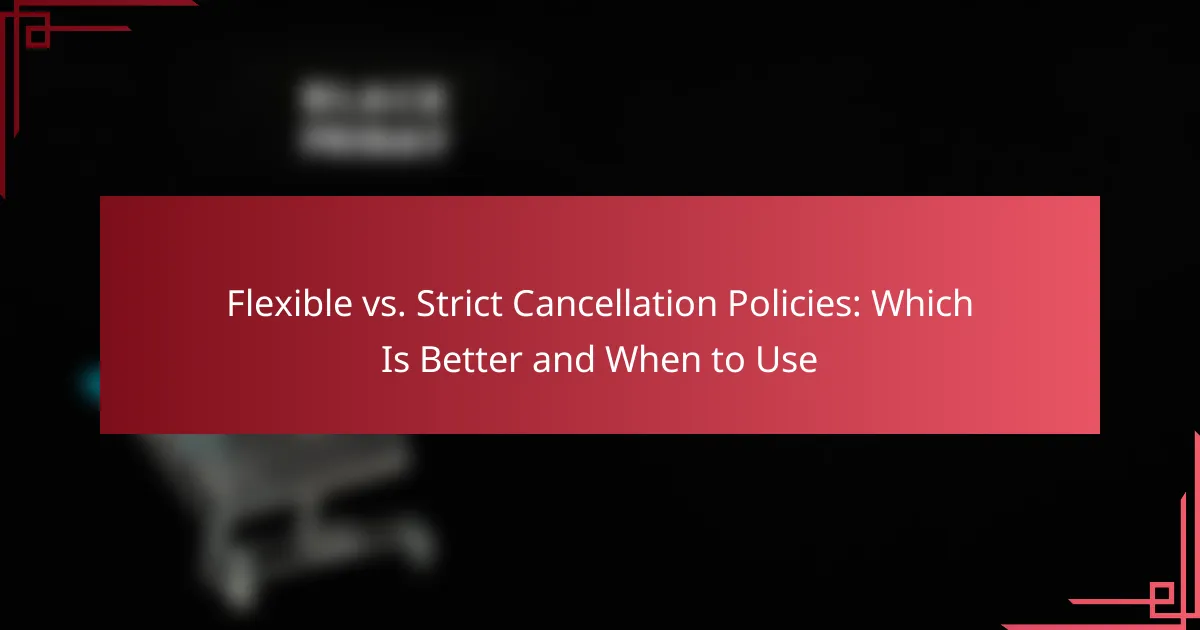Choosing between flexible and strict cancellation policies is crucial for businesses, as each approach has distinct advantages and drawbacks. Flexible policies can enhance customer satisfaction and loyalty by accommodating changing needs, while strict policies help protect revenue and manage resources effectively. Understanding when to implement each type is essential for balancing customer service with operational efficiency.
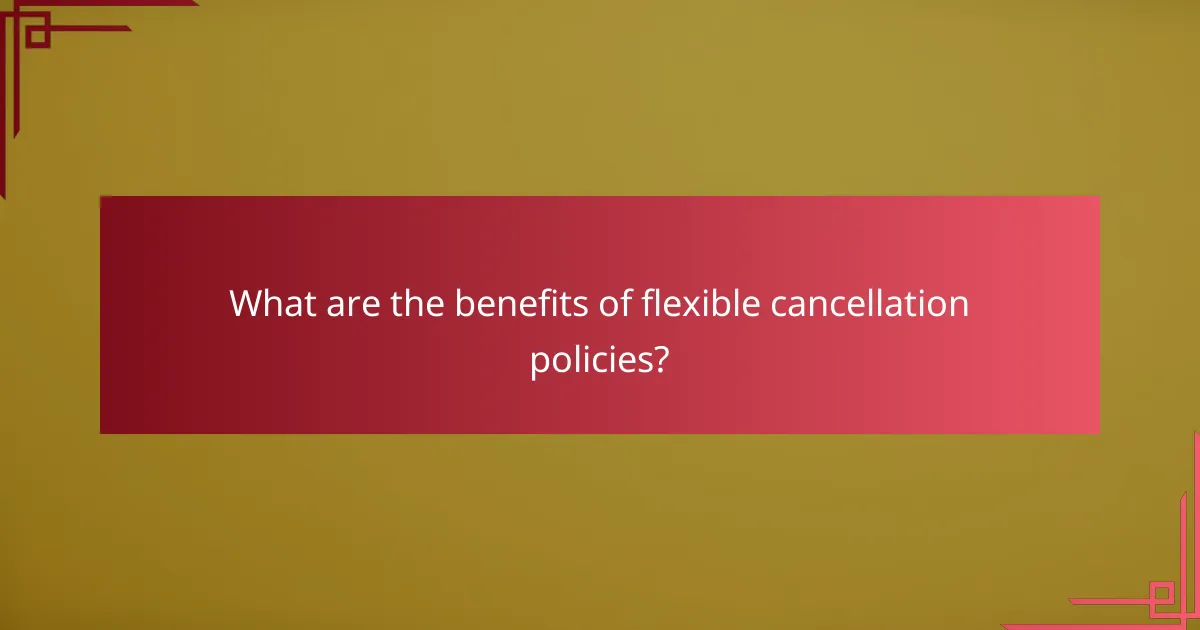
What are the benefits of flexible cancellation policies?
Flexible cancellation policies offer significant advantages for businesses by accommodating customer needs and reducing the risk of lost bookings. These policies can enhance overall customer experience, leading to increased satisfaction and loyalty.
Increased customer satisfaction
Flexible cancellation policies directly contribute to higher customer satisfaction by providing peace of mind. Customers appreciate the ability to change or cancel their plans without facing hefty penalties, which can lead to a more positive booking experience.
For example, a hotel that allows free cancellations up to 24 hours before check-in is likely to attract more guests than one with strict policies. This flexibility can be especially appealing during uncertain times, such as travel disruptions or personal emergencies.
Higher booking rates
Implementing flexible cancellation policies can lead to higher booking rates as potential customers feel more secure in their decisions. When customers know they can adjust their plans without financial loss, they are more inclined to complete their reservations.
Research suggests that businesses with flexible policies can see booking increases of 10-30%. This is particularly relevant in the travel and hospitality sectors, where customers often weigh cancellation terms heavily before making a commitment.
Enhanced brand loyalty
Flexible cancellation policies can foster enhanced brand loyalty by building trust with customers. When clients experience hassle-free cancellations, they are more likely to return for future bookings and recommend the brand to others.
For instance, a travel agency that prioritizes customer-friendly cancellation options may cultivate a loyal customer base that values the agency’s commitment to service. This loyalty can translate into repeat business and positive word-of-mouth, which are critical for long-term success.
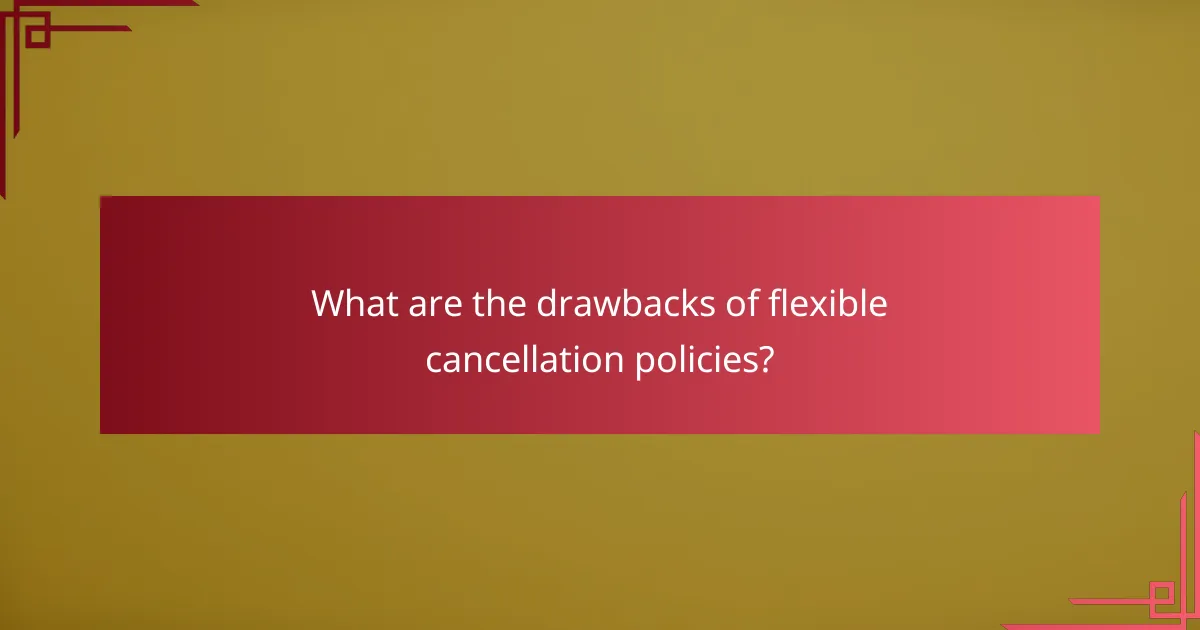
What are the drawbacks of flexible cancellation policies?
Flexible cancellation policies can lead to several drawbacks, primarily affecting revenue and operational efficiency. While they attract customers seeking convenience, the trade-offs can significantly impact a business’s bottom line and workload.
Potential revenue loss
Flexible cancellation policies may result in potential revenue loss due to increased cancellations. Customers are more likely to book services knowing they can easily change their plans, which can lead to higher cancellation rates. This unpredictability can make it challenging for businesses to forecast income and manage resources effectively.
For instance, a hotel with a flexible policy might experience a cancellation rate that is significantly higher than one with a strict policy. This could mean that rooms remain unoccupied, leading to lost revenue that could have been secured with a more rigid approach.
Increased administrative burden
Implementing flexible cancellation policies often creates an increased administrative burden. Staff may need to spend additional time processing cancellations, managing customer inquiries, and updating bookings. This can divert resources away from other critical areas of the business.
Moreover, tracking cancellations and adjustments can complicate accounting and inventory management. Businesses may need to invest in more sophisticated systems or software to handle the complexities that arise from flexible policies, leading to higher operational costs.
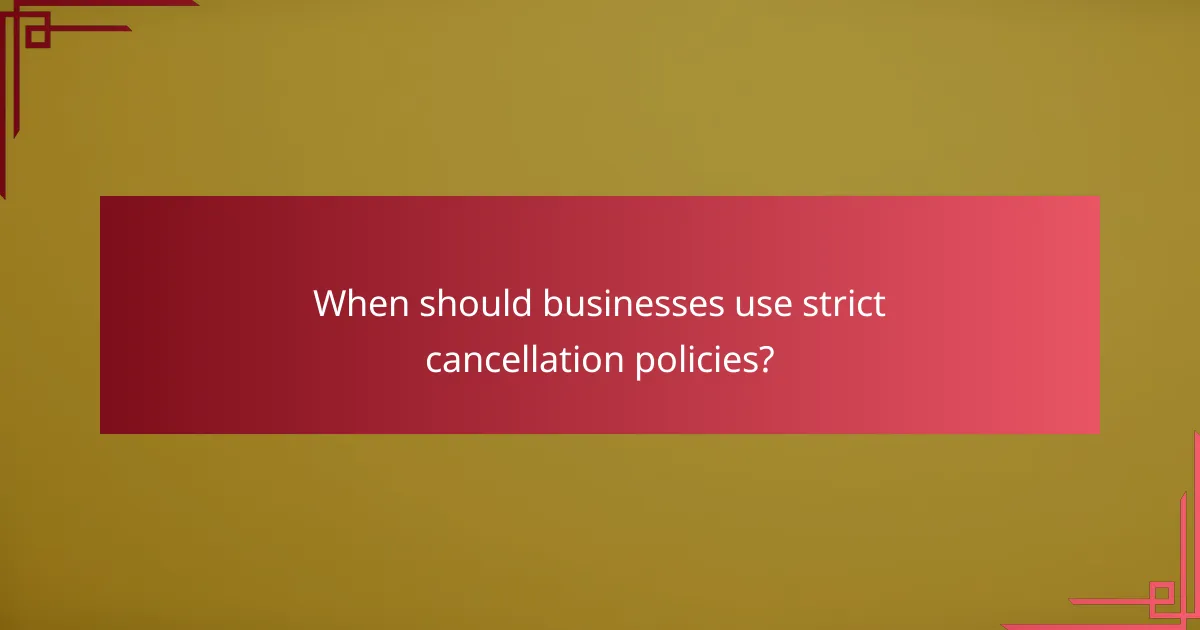
When should businesses use strict cancellation policies?
Businesses should implement strict cancellation policies when they need to protect their revenue and manage resources effectively. These policies are particularly useful in situations where last-minute cancellations can lead to significant financial losses or operational challenges.
High-demand seasons
During high-demand seasons, such as holidays or peak travel times, strict cancellation policies help ensure that bookings are honored. For instance, hotels and airlines often implement these policies to secure revenue during periods when demand exceeds supply.
In these scenarios, businesses can consider charging cancellation fees or requiring non-refundable deposits. This approach discourages last-minute cancellations, allowing companies to better manage their inventory and maximize profits.
Luxury service offerings
Luxury service providers, such as high-end restaurants or exclusive resorts, benefit from strict cancellation policies to maintain their brand’s prestige and profitability. These businesses often cater to a clientele that expects a certain level of commitment and exclusivity.
Implementing strict policies can include requiring full payment upfront or setting high cancellation fees. This not only secures revenue but also reinforces the value of the luxury experience, as clients are less likely to take their reservations lightly.
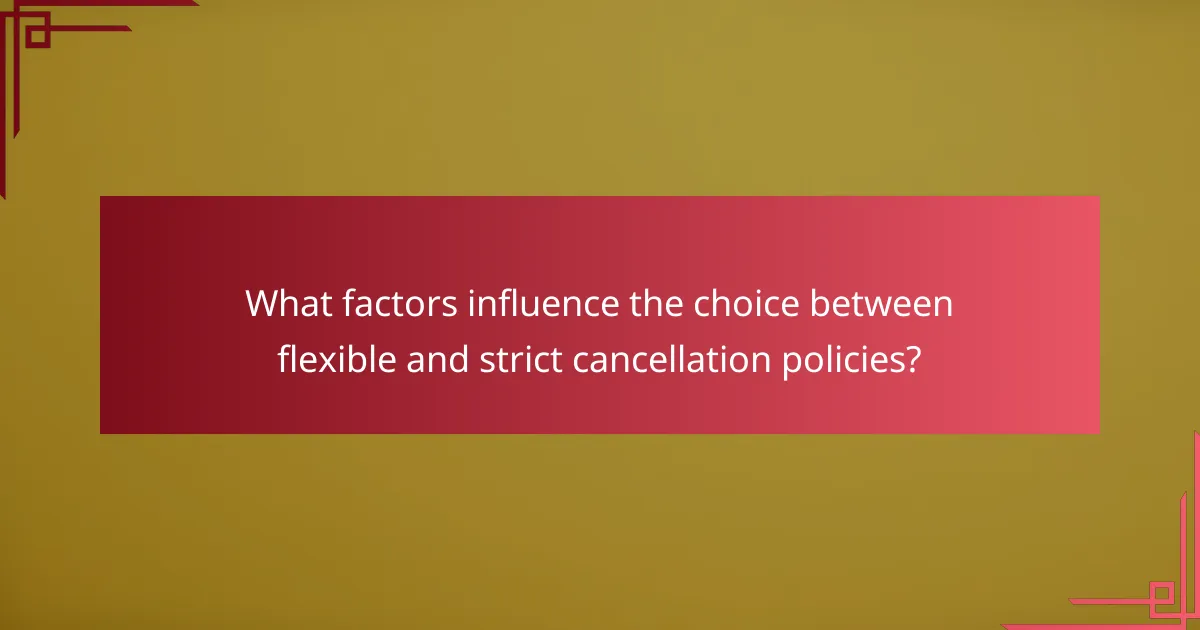
What factors influence the choice between flexible and strict cancellation policies?
The choice between flexible and strict cancellation policies is influenced by customer preferences, industry norms, and the specific business model. Understanding these factors can help businesses tailor their policies to meet client needs while balancing financial risks.
Target audience preferences
Customers often prefer flexible cancellation policies, especially in sectors like travel and accommodation, where plans can change unexpectedly. A survey might show that a significant portion of travelers would choose a provider offering easy cancellations over one with strict terms, even if it means slightly higher prices.
For businesses targeting corporate clients, strict policies may be more acceptable, as companies often have set travel budgets and schedules. Understanding the target audience’s expectations is crucial in determining the right approach.
Industry standards
Different industries have varying standards for cancellation policies. For example, airlines typically offer a mix of both flexible and strict options, allowing customers to choose based on their needs and willingness to pay. In contrast, the hospitality industry often leans towards flexible policies to attract more bookings.
It’s essential to stay informed about competitors’ policies to remain competitive. Businesses should regularly review industry trends and customer feedback to adjust their cancellation terms accordingly, ensuring they align with market expectations.
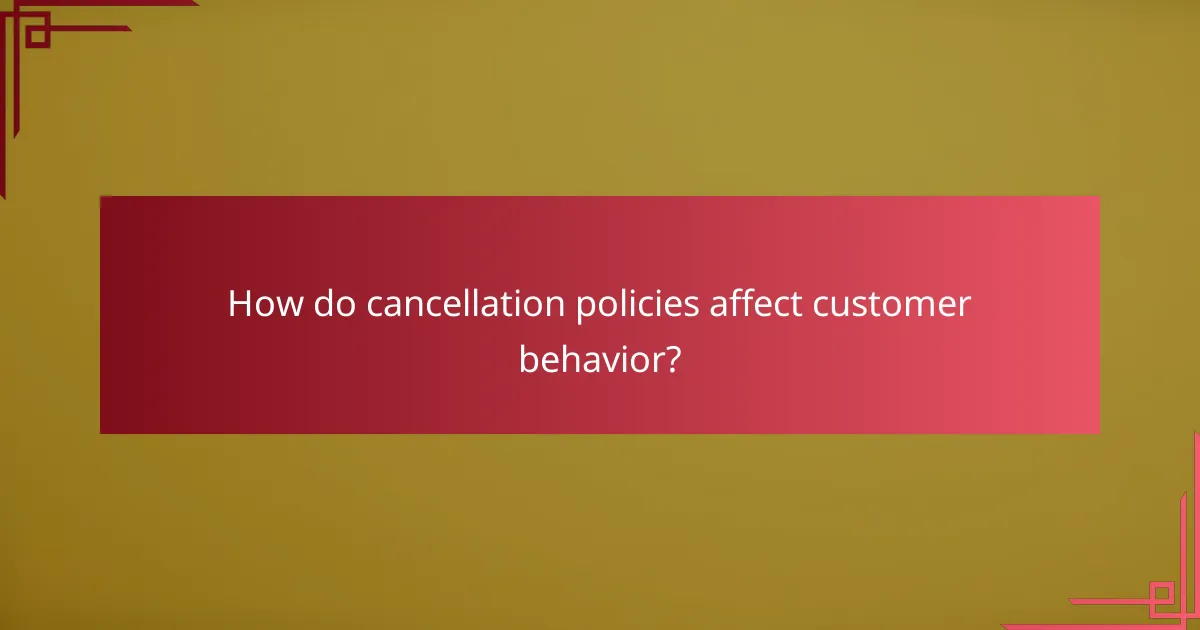
How do cancellation policies affect customer behavior?
Cancellation policies significantly influence customer behavior by shaping their booking decisions and expectations. A flexible policy can encourage more bookings, while a strict policy may deter potential customers who are uncertain about their plans.
Impact on booking decisions
Customers often weigh cancellation policies heavily when deciding whether to book. A flexible cancellation policy, allowing changes or refunds up to a certain date, tends to attract more bookings, especially for travel and event reservations. In contrast, strict policies can lead to hesitation, as potential customers may fear losing money if their plans change.
For example, a hotel offering free cancellation up to 48 hours before arrival may see a higher conversion rate compared to one that enforces a non-refundable rate. This flexibility can be a decisive factor for customers who prioritize risk management in their travel plans.
Influence on repeat business
Cancellation policies also play a crucial role in fostering repeat business. Customers who have positive experiences with flexible policies are more likely to return, as they feel valued and secure in their choices. A strict cancellation policy, however, can lead to dissatisfaction, especially if customers face unexpected changes.
To encourage loyalty, businesses should consider implementing a balance between flexibility and necessary restrictions. For instance, offering a loyalty program that rewards repeat customers with more lenient cancellation terms can enhance customer retention and satisfaction.
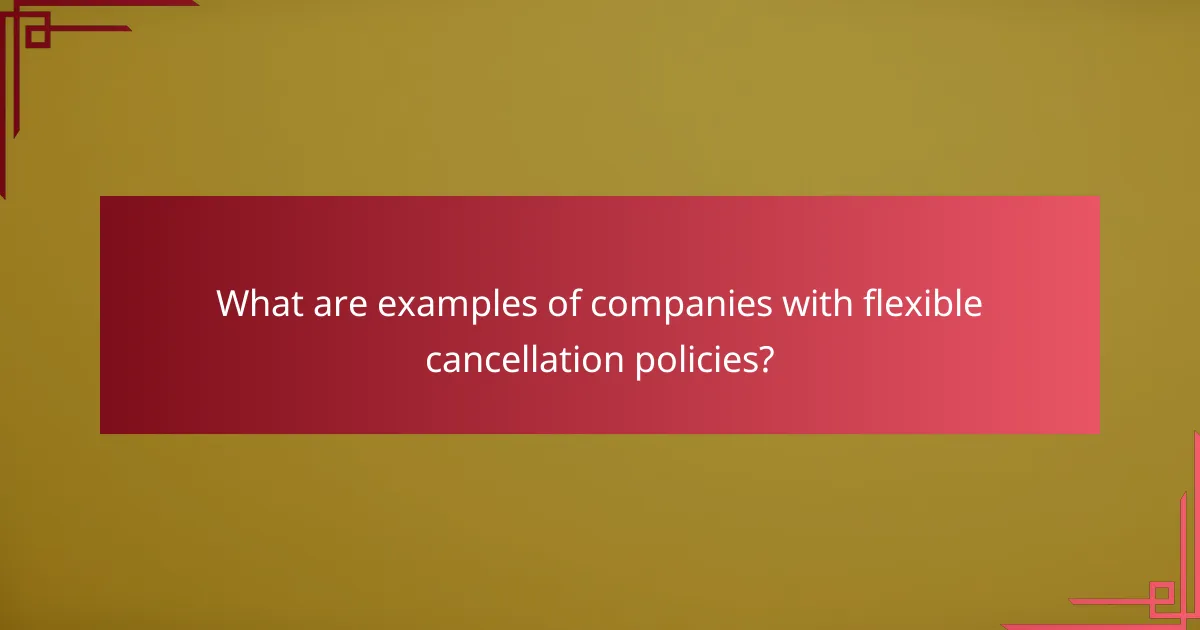
What are examples of companies with flexible cancellation policies?
Companies with flexible cancellation policies allow customers to cancel or modify their bookings with minimal penalties, often up to a day or two before the scheduled date. This approach caters to travelers who may need to adjust their plans due to unforeseen circumstances.
Airbnb
Airbnb offers various cancellation policies that hosts can choose from, including flexible, moderate, and strict options. The flexible policy allows guests to cancel up to 24 hours before check-in for a full refund, making it ideal for those who may change their travel plans at the last minute.
When using Airbnb, it’s important to review the specific cancellation policy of each listing, as hosts have the discretion to set their own terms. This flexibility can provide peace of mind for travelers, but also requires careful attention to individual host rules.
Booking.com
Booking.com features a range of accommodations with flexible cancellation options, often allowing free cancellations up to a few days before arrival. Many properties highlight their cancellation policies clearly, enabling users to filter search results based on flexibility.
Travelers should always check the cancellation terms before booking, as some listings may still impose fees for late cancellations. Utilizing the platform’s filters can help identify the best options for those needing flexibility in their travel plans.
